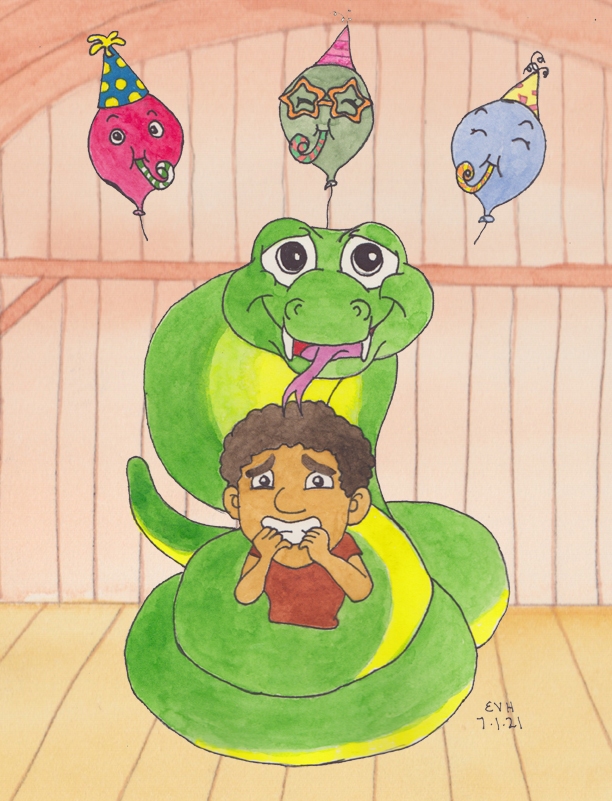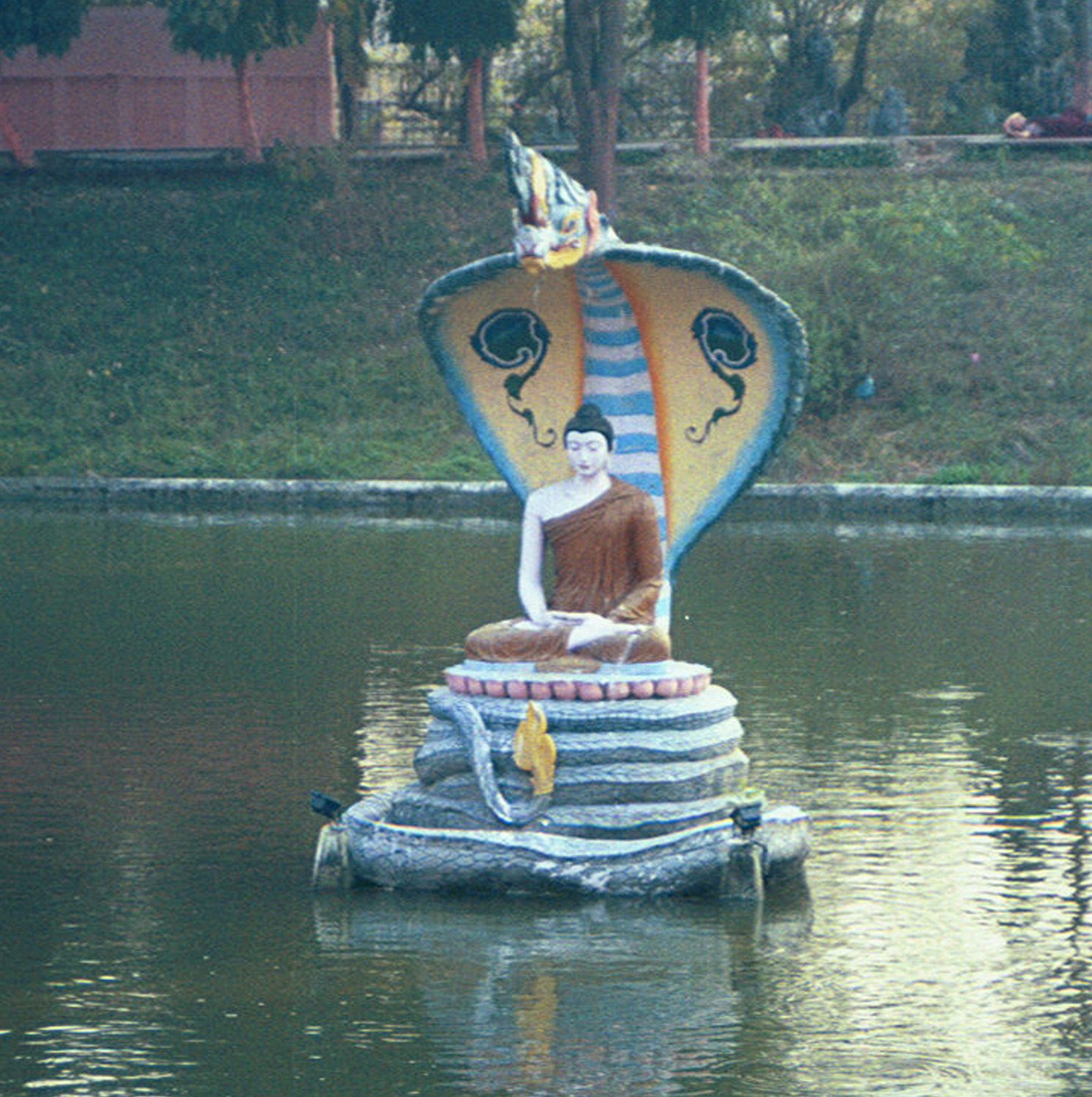
Jataka 253
Maṇi Kaṇṭha Jātaka
The Naga King
as told by Eric Van Horn
originally translated by William Henry Denham Rouse, Cambridge University
originally edited by Professor Edward Byles Cowell, Cambridge University
This is a curious tale in which a serpent—a “nāga”—takes the shape of a man and becomes best friends with a recluse. But when he shows his true form, the recluse becomes frightened and does not want to see him again. So he manages to drive away the nāga by persistently and annoyingly begging.
The part of the story where the serpent wraps himself around the recluse is reminiscent of the story from the Pāli Canon that took place after the Buddha’s enlightenment. A nāga named “Mucalinda” wrapped himself around the Buddha to protect him from the rain.
“Rich food and drink.” The Master told this story while he was living at the shrine of Aggālava near Ālavī. It is about the monastic rules for building huts.
( Ālavī was a town 30 “yojanas”—360 kilometers—from Sāvatthi and probably 12—144 kilometers—from Benares. It lay between Sāvatthi and Rājagaha. The Buddha, on several occasions, stayed there at the Aggālava shrine which was near the town. )
Some monks who lived in Ālavī were begging from everyone and everywhere for the materials for houses which they were having built for themselves. They were forever pestering people. “Give us a man, give us somebody to do servant’s work,” and so forth. Everybody was annoyed at this constant begging and solicitation. They became so annoyed that at the mere sight of these monks they were startled and scared away.
It happened that the venerable Mahākassapa entered Ālavī, and he walked about the town in search of alms. The people, as soon as they saw the elder, ran away. After the mealtime and having returned from his rounds, he summoned the monks and said to them, “Once Ālavī was a wonderful place for alms. Why is it so poor now?" They told him the reason.
Now the Blessed One was at the time living at the Aggālava shrine. The elder went to the Blessed One and told him what was happening. The Master convened the monks to discuss the matter. “I hear,” he said, “that you are building huts and pestering everybody for help. Is this true?” They said it was. Then the Master rebuked them, adding these words: “Even in the serpent world, monks, as abundantly full as it is of the seven precious stones ( gold, silver, lapis lazuli, seashell, agate, pearl, and ruby), this kind of begging is distasteful to the serpents. How much more to men, from whom it is as hard to get a rupee as it is to skin a flint!” And he told them this story from the past.
Once upon a time, when Brahmadatta reigned in Benares, the Bodhisatta was born as a rich brahmin’s son. When he was old enough to run about, his mother gave birth to another wise being. Both the brothers, when they grew up, were so deeply pained at their parents' death that they became recluses. They lived in leaf-huts which they made them at a bend of the Ganges River. The elder had his lodge by the upper Ganges, and the younger by the lower river.
One day, a Serpent-King whose name was Maṇikaṇṭha, or “Jewel-throat”, left his home and took the shape of a man. He walked along the river bank until he came to the younger brother’s hermitage. He greeted the owner and sat down at one side. They talked pleasantly together, and they became such good friends that they could not stand being apart from each other. Jewel-throat came frequently to visit the younger recluse. One day they sat talking and chatting. When he was ready to leave, he loved the man so much that he cast off his form as a man. He encircled the ascetic with snake’s folds and embraced him with his great hood on his head. There he lay for a while until his affection was satisfied. Then he let go of his friend’s body, and bidding him farewell, returned to his own place.

Figure: The serpent reveal party
This experience frightened the recluse so much that he grew thin, dirty, and wretched. He lost his color, growing yellower and yellower, and the veins showed through his skin.
One day he paid a visit to his brother. “Why, brother,” he said, “what makes you thin? How did you lose your color? Why are you so yellow, and why do your veins stand out like this upon your skin?”
His brother told him what had happened.
“Come tell me,” said the elder brother, “do you like him to visit or not?”
“No, I don't,” was the reply.
“Well, what ornament does the Serpent-King wear when he visits you?”
“A precious jewel!”
“Very well. When he comes again, before he has time to sit down, beg him to give you the jewel. Then he will leave without embracing you in his snaky folds. On the next day, stand at your door and ask him for it there. And on the third day ask him just as he emerges from the river. He will never visit you again.”
The younger brother promised to do this, and he returned to his hut. On the next day, when the Serpent showed up, the recluse cried, “Give me your beautiful jewel!” The Serpent hurried away without sitting down.
On the next day, the hermit stood at his door and called out to the Serpent, “You would not give me your jewel yesterday! Now today you must!” And the Serpent slipped off without entering the hut.
On the third day, the man called out just as the Serpent was emerging from the water, “This is the third day that I have asked you for it. Come, give this jewel to me!” And the Serpent, speaking from his place in the water, refused, in the words of these two stanzas:
“Rich food and drink in plenty I can have
By means of this fine jewel which you crave:
You ask too much; the gem I will not give;
Nor visit you again while I shall live.
“Like lads who wait with tempered sword in hand,
You scare me as my jewel you demand,
You ask too much; the gem I will not give,
Nor ever visit you while I shall live!”
With these words, the King of the Serpents plunged beneath the water and went to his own place, never to return.
Then the recluse, not seeing his beautiful Serpent-King again, became thinner and thinner still. He grew even more squalid, lost his color worse than before, and grew more yellow, and the veins rose thicker on his skin!
The elder brother thought he would go and see how his brother was doing. He found him yellower than he had been before.
“Why, how can this be? You are worse than ever!” he said.
His brother replied, “It is because I never see the lovely King of Serpents!”
“This recluse,” the elder brother said, on hearing his answer, “cannot live without his Serpent-King;,” and he repeated the third verse:
“Do not beg a man whose love you prize,
For begging makes you hateful in his eyes.
The brahmin begged the Serpent’s gem so sore
He disappeared and never came back more.”
Then he counselled his brother not to grieve, and with this consolation, left him and returned to his own hermitage. After that the two brothers cultivated the Five Faculties ( 1) faith/confidence, 2) energy, 3) mindfulness, 4) concentration/samadhi and 5) wisdom/insight) and the Attainments (jhānas) and became destined for the heaven of Brahma.
The Master added, “Thus, monks, even in the world of serpents, where are the seven precious stones in abundance, begging is disliked by the serpents. How much more it is despised by men!” And, after teaching them this lesson, he identified the birth: “At that time Ānanda was the younger brother, and I was the elder brother.”

Figure: The Nāga Mucalinda protects the Buddha
